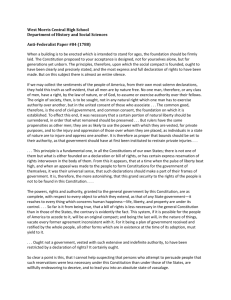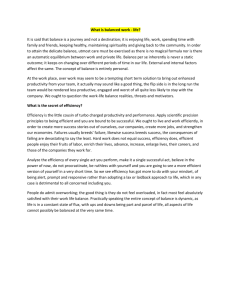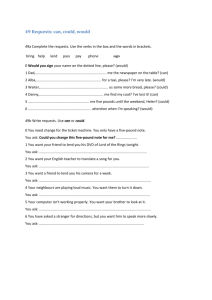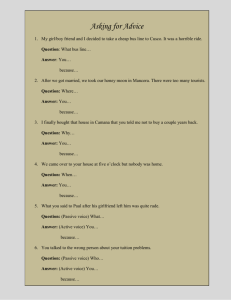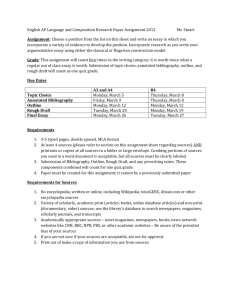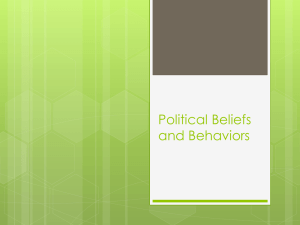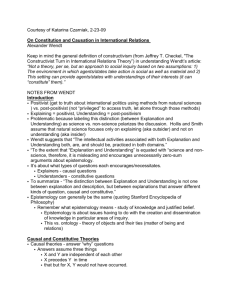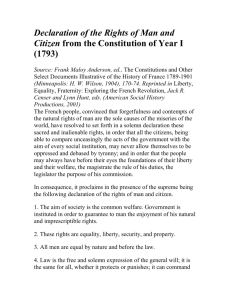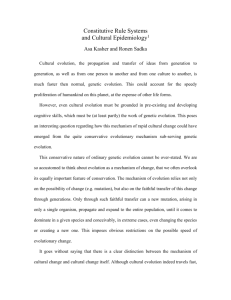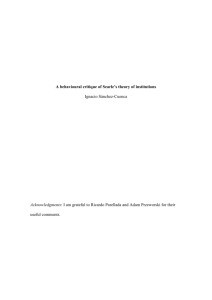Searle Constitution NC
advertisement
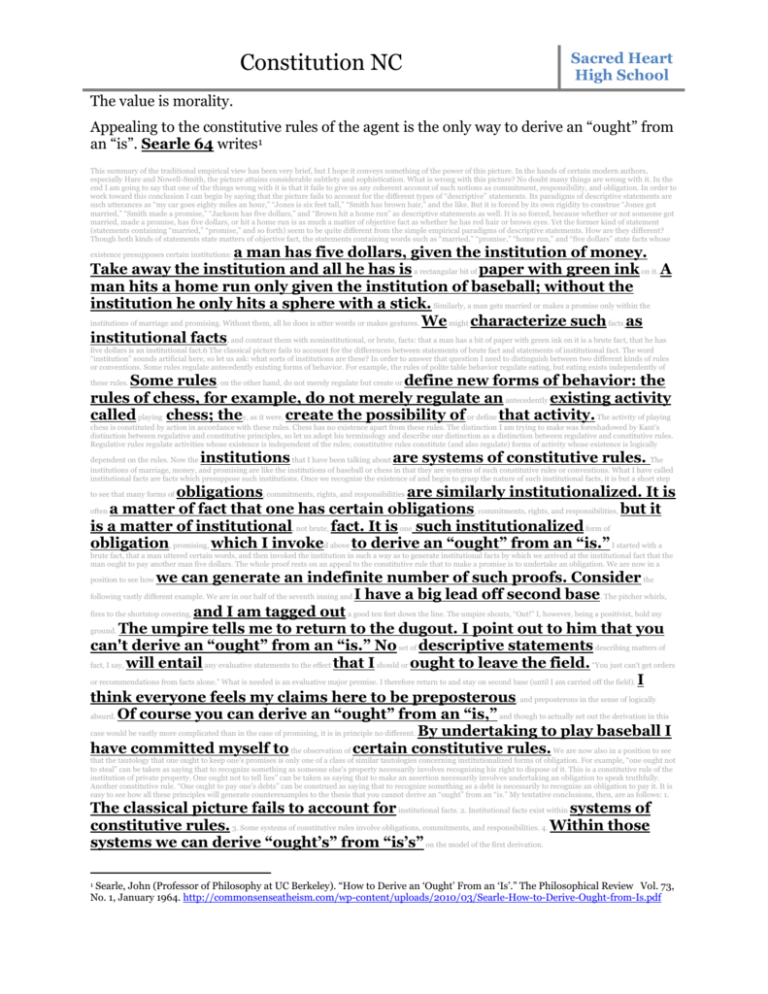
Constitution NC Sacred Heart High School The value is morality. Appealing to the constitutive rules of the agent is the only way to derive an “ought” from an “is”. Searle 64 writes1 This summary of the traditional empirical view has been very brief, but I hope it conveys something of the power of this picture. In the hands of certain modern authors, especially Hare and Nowell-Smith, the picture attains considerable subtlety and sophistication. What is wrong with this picture? No doubt many things are wrong with it. In the end I am going to say that one of the things wrong with it is that it fails to give us any coherent account of such notions as commitment, responsibility, and obligation. In order to work toward this conclusion I can begin by saying that the picture fails to account for the different types of “descriptive” statements. Its paradigms of descriptive statements are such utterances as “my car goes eighty miles an hour,” “Jones is six feet tall,” “Smith has brown hair,” and the like. But it is forced by its own rigidity to construe “Jones got married,” “Smith made a promise,” “Jackson has five dollars,” and “Brown hit a home run” as descriptive statements as well. It is so forced, because whether or not someone got married, made a promise, has five dollars, or hit a home run is as much a matter of objective fact as whether he has red hair or brown eyes. Yet the former kind of statement (statements containing “married,” “promise,” and so forth) seem to be quite different from the simple empirical paradigms of descriptive statements. How are they different? Though both kinds of statements state matters of objective fact, the statements containing words such as “married,” “promise,” “home run,” and “five dollars” state facts whose a man has five dollars, given the institution of money. Take away the institution and all he has is a rectangular bit of paper with green ink on it. A man hits a home run only given the institution of baseball; without the institution he only hits a sphere with a stick. Similarly, a man gets married or makes a promise only within the institutions of marriage and promising. Without them, all he does is utter words or makes gestures. We might characterize such facts as institutional facts, and contrast them with noninstitutional, or brute, facts: that a man has a bit of paper with green ink on it is a brute fact, that he has existence presupposes certain institutions: five dollars is an institutional fact.6 The classical picture fails to account for the differences between statements of brute fact and statements of institutional fact. The word “institution” sounds artificial here, so let us ask: what sorts of institutions are these? In order to answer that question I need to distinguish between two different kinds of rules or conventions. Some rules regulate antecedently existing forms of behavior. For example, the rules of polite table behavior regulate eating, but eating exists independently of Some rules, on the other hand, do not merely regulate but create or define new forms of behavior: the rules of chess, for example, do not merely regulate an antecedently existing activity called playing chess; they, as it were, create the possibility of or define that activity. The activity of playing these rules. chess is constituted by action in accordance with these rules. Chess has no existence apart from these rules. The distinction I am trying to make was foreshadowed by Kant’s distinction between regulative and constitutive principles, so let us adopt his terminology and describe our distinction as a distinction between regulative and constitutive rules. Regulative rules regulate activities whose existence is independent of the rules; constitutive rules constitute (and also regulate) forms of activity whose existence is logically institutions are systems of constitutive rules. dependent on the rules. Now the that I have been talking about The institutions of marriage, money, and promising are like the institutions of baseball or chess in that they are systems of such constitutive rules or conventions. What I have called institutional facts are facts which presuppose such institutions. Once we recognize the existence of and begin to grasp the nature of such institutional facts, it is but a short step obligations, commitments, rights, and responsibilities are similarly institutionalized. It is a matter of fact that one has certain obligations, commitments, rights, and responsibilities, but it is a matter of institutional, not brute, fact. It is one such institutionalized form of obligation, promising, which I invoked above to derive an “ought” from an “is.” I started with a to see that many forms of often brute fact, that a man uttered certain words, and then invoked the institution in such a way as to generate institutional facts by which we arrived at the institutional fact that the man ought to pay another man five dollars. The whole proof rests on an appeal to the constitutive rule that to make a promise is to undertake an obligation. We are now in a we can generate an indefinite number of such proofs. Consider the I have a big lead off second base. The pitcher whirls, fires to the shortstop covering, and I am tagged out a good ten feet down the line. The umpire shouts, “Out!” I, however, being a positivist, hold my ground. The umpire tells me to return to the dugout. I point out to him that you can't derive an “ought” from an “is.” No set of descriptive statements describing matters of fact, I say, will entail any evaluative statements to the effect that I should or ought to leave the field. “You just can't get orders or recommendations from facts alone.” What is needed is an evaluative major premise. I therefore return to and stay on second base (until I am carried off the field). I think everyone feels my claims here to be preposterous, and preposterous in the sense of logically absurd. Of course you can derive an “ought” from an “is,” and though to actually set out the derivation in this case would be vastly more complicated than in the case of promising, it is in principle no different. By undertaking to play baseball I have committed myself to the observation of certain constitutive rules. We are now also in a position to see position to see how following vastly different example. We are in our half of the seventh inning and that the tautology that one ought to keep one's promises is only one of a class of similar tautologies concerning institutionalized forms of obligation. For example, “one ought not to steal” can be taken as saying that to recognize something as someone else's property necessarily involves recognizing his right to dispose of it. This is a constitutive rule of the institution of private property. One ought not to tell lies” can be taken as saying that to make an assertion necessarily involves undertaking an obligation to speak truthfully. Another constitutive rule. “One ought to pay one’s debts” can be construed as saying that to recognize something as a debt is necessarily to recognize an obligation to pay it. It is easy to see how all these principles will generate counterexamples to the thesis that you cannot derive an “ought” from an “is.” My tentative conclusions, then, are as follows: 1. The classical picture fails to account for institutional facts. 2. Institutional facts exist within systems of constitutive rules. 3. Some systems of constitutive rules involve obligations, commitments, and responsibilities. 4. Within those systems we can derive “ought’s” from “is’s” on the model of the first derivation. Searle, John (Professor of Philosophy at UC Berkeley). “How to Derive an ‘Ought’ From an ‘Is’.” The Philosophical Review Vol. 73, No. 1, January 1964. http://commonsenseatheism.com/wp-content/uploads/2010/03/Searle-How-to-Derive-Ought-from-Is.pdf 1 Constitution NC Sacred Heart High School The constitution is the constitutive rule of all government agents. Madison et al write2 This Constitution, and the Laws of the United States which shall be made in Pursuance thereof; and all Treaties made, or which shall be made, under the Authority of the United States, shall be the supreme Law of the Land; and the Judges in every State shall be bound thereby, any Thing in the Constitution or Laws of any State to the Contrary notwithstanding. The Senators and Representatives before mentioned, and the Members of the several State Legislatures, and all executive and judicial Officers, both of the U nited States and of the several States, shall be bound by Oath or Affirmation, to support this Constitution; but no religious Test shall ever be required as a Qualification to any Office or public Trust under the United States. Article 7. The Ratification of the Conventions of nine States, shall be sufficient for the Establishment of this Constitution between the States so ratifying the Same. [This was] Done in Convention by the Unanimous Consent of the States present the Seventeenth Day of September in the Year of our Lord one thousand seven hundred and Eighty seven and of the Independence of the United States of America the Twelfth. In Witness whereof We have hereunto subscribed our Names. Therefore the criterion is adhering to the constitution. Rehabilitation disrespects 5th and 14th Amendment due process protections. Bull 103 The operation of rehabilitative model has led to sentences that are indeterminate, on the basis that a person should only be released from obligations when, in the opinion of the experts, a “cure” has been achieved. The problems associated with rehabilitative approaches include: Limited empirical evidence of their success (Martinson 1974), although recent meta-analysis of large numbers of small rehabilitative schemes has suggested that positive results can be obtained in favorable circumstances and selected offenders (Hudson 2003, p. 30) A lack of due process; indeterminate or semi-determinate sentence place the release of offenders in the hands of prison or probation authorities, often without firm criteria for decision-making, clear accountability or avenues for appeal. A disregard for the rights of individuals, that they are not to be subjected to compulsory state intervention that is disproportionate to the seriousness of the crime committed The potential for net widening: even if the crime is relatively minor, an offender who is assessed as needing help might be drawn into the criminal justice system and subject to state control for a considerable period. John Dickinson, Gouverneur Morris, Thomas Jefferson, John Adams, Thomas Paine, Edmund Randolph, James Madison, Roger Sherman, James Wilson, and George Wythe (Founding Fathers). Constitution. 1787. 3 Melissa Bull, Senior Lecturer Criminology- Griffith University, 2010, Punishment and Sentencing: Risk, Rehabilitation and Restitution, p. 29 2
